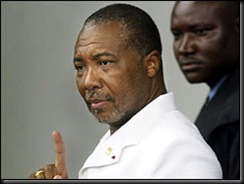Archives Off-Limits In War Crimes Trial
Personal Files Of Ex-Liberian Leader Charles Taylor Won't Be Seized For Evidence Of Atrocities
 Judges in the war crimes trial of Charles Taylor have refused to allow the seizure of the Liberian president's personal archive, despite the possibility that it contains documents implicating Taylor in atrocities in Sierra Leone.
Judges in the war crimes trial of Charles Taylor have refused to allow the seizure of the Liberian president's personal archive, despite the possibility that it contains documents implicating Taylor in atrocities in Sierra Leone.
At a hearing Tuesday at the U.N.-backed Special Court for Sierra Leone, Presiding Judge Julia Sebutinde said prosecutors had given no valid reason for the documents to be seized.
Prosecutors argued that the archive likely contains documents that would incriminate Taylor, who is charged with arming and supporting rebels who murdered thousands of civilians and hacked off the limbs of thousands more during Sierra Leone's 10-year civil war, which ended in 2002. Taylor has pleaded innocent.
Sitting in court Tuesday in a dark blue suit and yellow tie, Taylor looked relaxed, sometimes chatting and laughing with his lawyers. He is being tried in The Hague because of fears that holding the case in Sierra Leone could re-ignite violence there.
In a motion, prosecutors argued that it was "highly probable that the accused's personal archives' contain relevant material which will materially assist the prosecution case."
But judges who are to restart Taylor's trial on Jan. 7, rejected the request as too vague, saying it "has all the hallmarks of a fishing expedition."
In a written ruling, judges said prosecutors had "not identified the information sought, nor even described it by its general nature."
Taylor's trial began in June but was immediately suspended after he boycotted the hearing and fired his attorney. He has since appointed a new legal team.
Sebutinde said prosecutors will begin presenting evidence on Jan. 7.
Prosecutors have said they will call former members of Taylor's inner circle to testify against him as well as victims and survivors of atrocities in Sierra Leone. The trial is expected to last 18 months.

